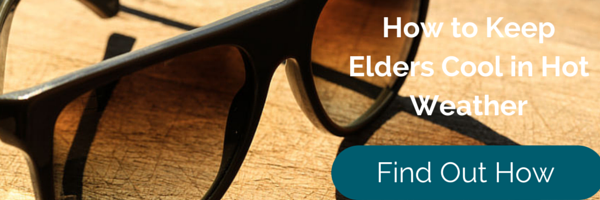 Summer living can offer older adults plenty of opportunities to experience life at its fullest, but warmer weather also brings a number of senior healthcare dangers that can threaten lazy summer days.
Summer living can offer older adults plenty of opportunities to experience life at its fullest, but warmer weather also brings a number of senior healthcare dangers that can threaten lazy summer days.
Our senior wellness experts have the scoop on three of the biggest summer dangers.
1. Skin Cancer
As we mentioned in our earlier blog on summer skincare for seniors, more than 2 million Americans are diagnosed with skin cancer every year, and about half of the population will develop at least one of the two most common forms of skin cancer by the time they turn 65.
Take steps to keep your skin happy and healthy this summer:
- Stay indoors or under cover during the sun’s peak hours of intensity from ten in the morning to four in the afternoon.
- Wear a summer wardrobe of dark colored, tightly woven, and sun-protective clothing when in the sun; cap off your ensemble with a brimmed sunhat.
- Keep your eyes protected with wraparound sunglasses.
- Use a broad-spectrum sunscreen of at least 15 SPF and reapply at least every two hours.
Protect yourself from skin cancer by scheduling an annual exam with your senior healthcare provider and by learning the warning signs of skin cancer.
2. Heated Related Illnesses
The aging body loses its ability to acclimate efficiently to high temperatures and regulate body cooling, and to complicate matters, certain prescription medicines that improve senior living can further inhibit perspiration—the body’s cooling mechanism.
Extreme elevation of body temperature can cause serious heat-related illnesses like heat exhaustion and heat stroke. Turn down the heat in senior living with these tips:
- Stay Cool. Extreme fluctuations in temperature can shock to the system, but a cool (not cold) bath, shower, or compress can take the edge off the heat.
- Dress the Part. Nonrestrictive, lightweight and light-colored clothes offer plenty of cooling power when stuck indoors in the high heat. Just remember to wear the proper protection when in the sun.
- Stay Hydrated. Drink plenty of water and electrolyte supplements like sports drinks or fruit juice.
- Safety First. Older adults should try to limit how much time they spend in the heat. Take frequent breaks in the shade when out-of-doors and visit an air-conditioned restaurant or shopping center if your home doesn’t have an efficient cooling system.
The American Red Cross’ caregiving checklist can help you recognize and respond to serious heat-related conditions.
3. Bug Bites
Summer brings the return of balmy nights, gorgeous blue-sky days, and a host of things that creep, crawl, and sting.
Bites and stings aren’t just annoying. They can be deadly too.
Lyme Disease. Transmitted through tick bites, Lyme disease can spread throughout the body, infecting your joints, heart, and nervous system when left untreated. Always check yourself over for ticks after visiting wooded parks this summer, and learn to recognize the warning signs of Lyme Disease.
- A warm, but not itchy, red rash that can fade into a bull’s-eye pattern spreads across the skin
- Fatigue, chills, fever, headache, muscle pains, joint aches, and swollen lymph nodes
You can visit the CDC for more information on how to keep your senior living free from Lyme Disease.
West Nile. Not every mosquito carries West Nile, and not everyone who is bitten by an infected bug will get sick, but with more than 30,000 serious cases reported in the US during the last fourteen years, it’s always a good move to take precautions.
- Always apply insect repellent when you spend time out-of-doors.
- Wear trousers and long-sleeves when in buggy areas.
- Stay indoors or use extra repellent during peak hours of activity between dusk and dawn.
The CDC has more on prevention and control, including how you can mosquito-proof your senior living.
Anaphylaxis. Many people are allergic to bug bites and bee stings—it’s why they hurt or itch so badly. In some people, this allergy can lead to deadly anaphylactic shock. Anaphylaxis requires immediate medical attention, so learn to recognize the common symptoms:
- Abnormal breathing patterns like wheezing or continuous coughing
- Anxiety or confusion
- Tightness or discomfort in the chest
- Dizziness or light-headedness that can cause nausea and vomiting
- Reddening of the skin which can be accompanied by itchiness or hives
- Swelling of the face, eyes, or tongue
Talk to your senior healthcare team about how you can practice better summer safety.












